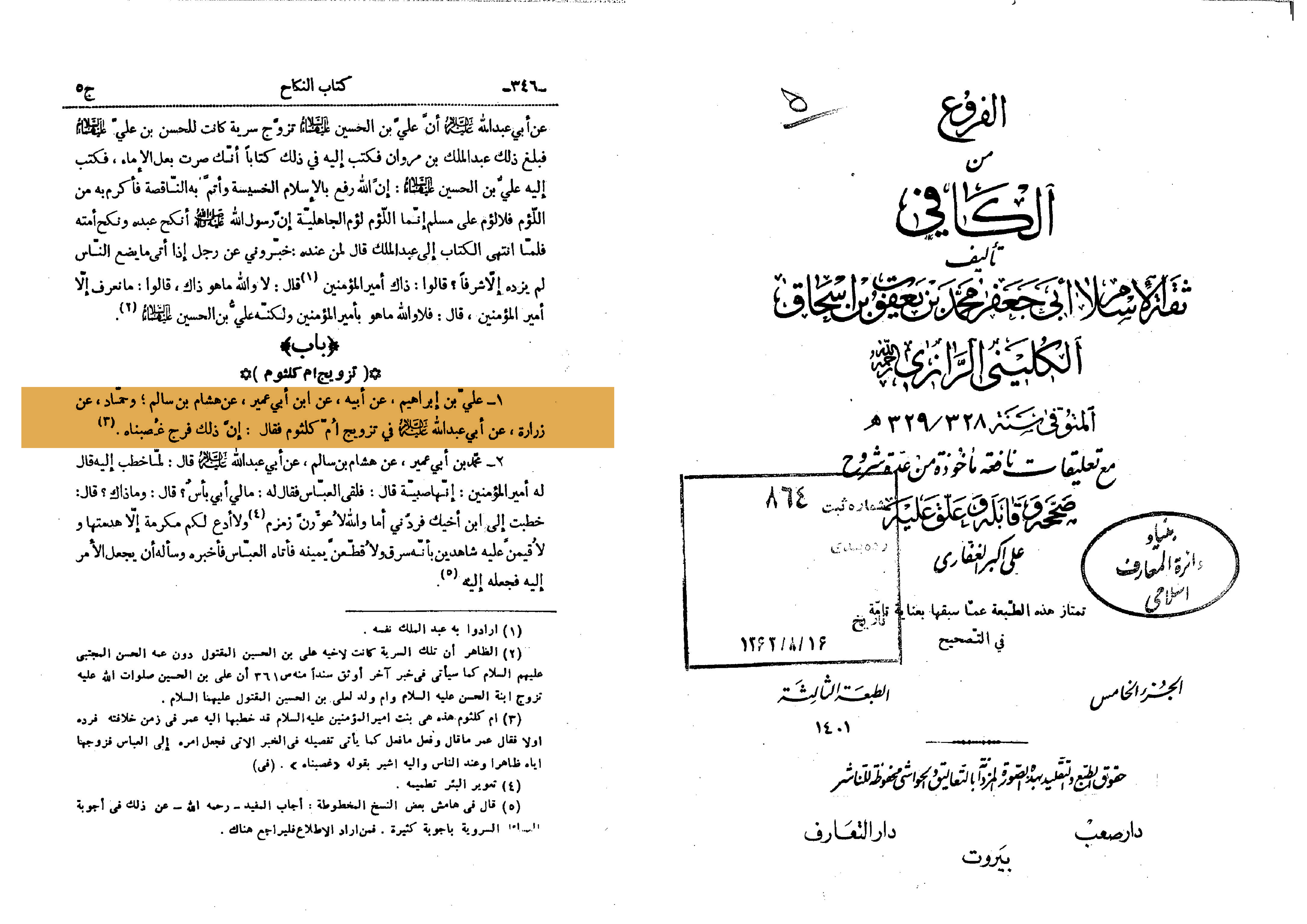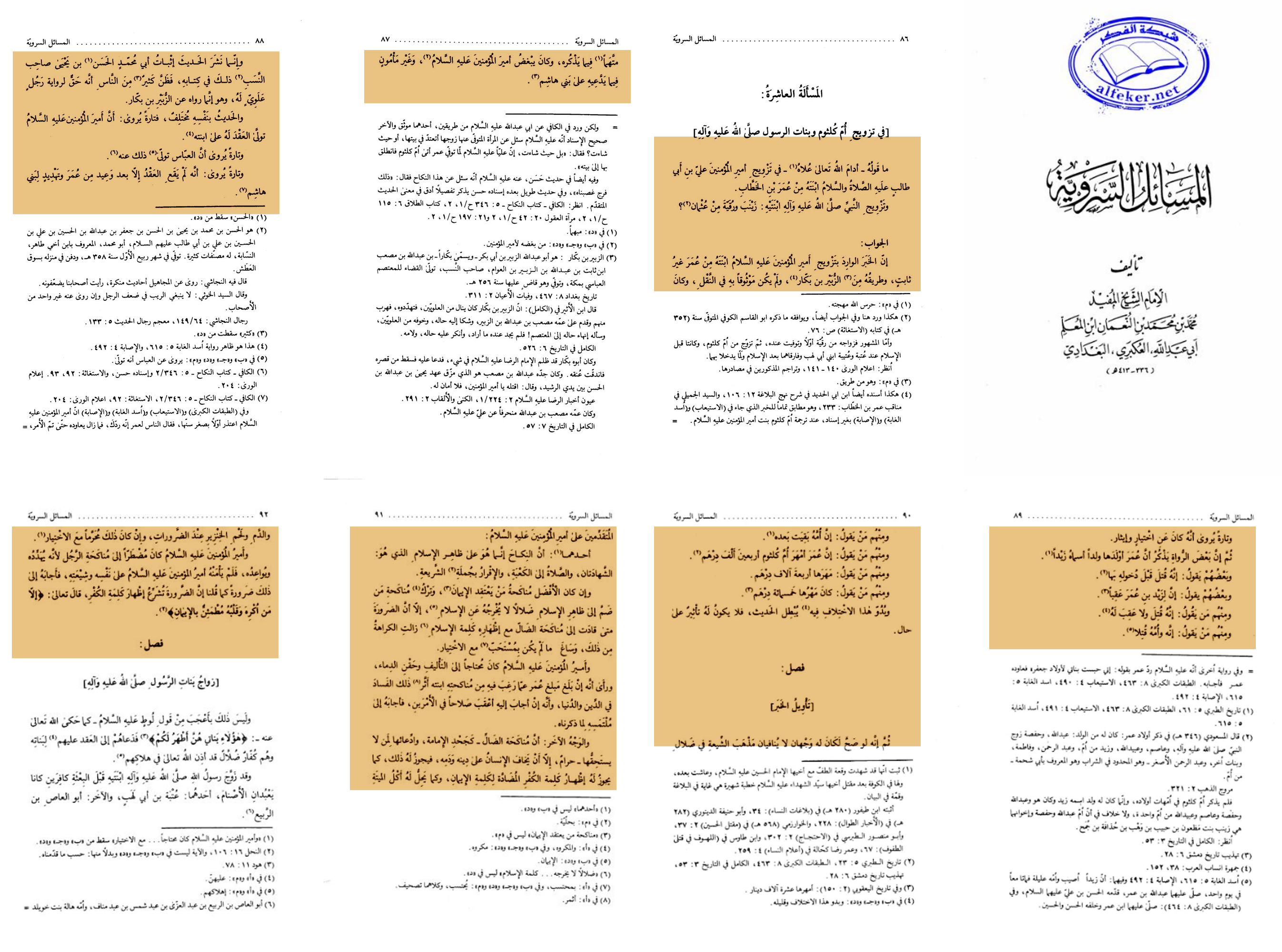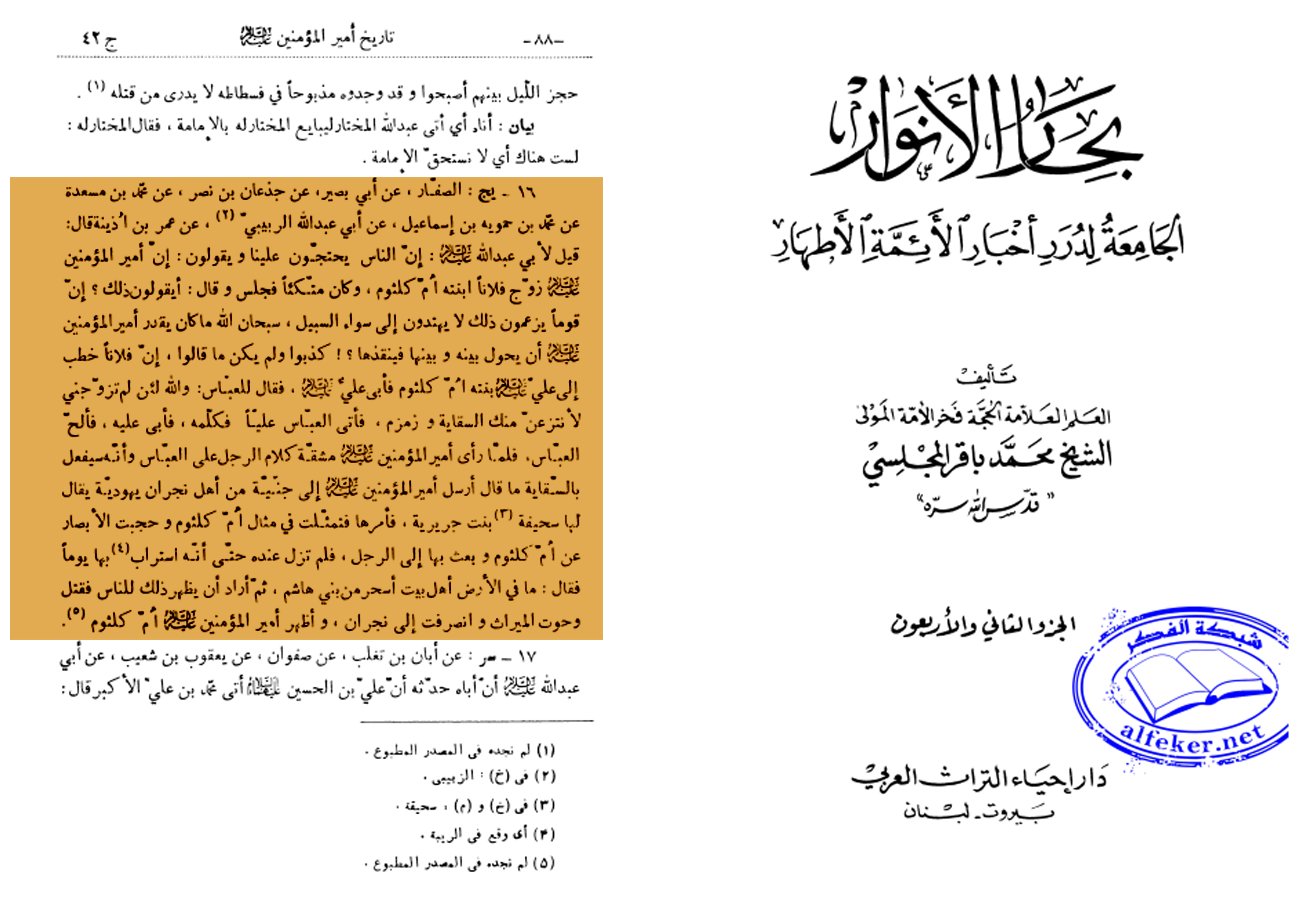People often accuse the Shia community of being contradictory when they deny the alleged marriage of Umm Kulthūm, the daughter of Imam Ali (a.s) and Lady Fatima (s.a), to Umar ibn al-Khattab. The usual claim is that "even in your own books it is written that the marriage happened." These accusations are often circulated online in the form of memes, reels, and sarcastic commentary — but they rely on surface-level readings and a deep misunderstanding of Shia scholarship, context, and the doctrine of taqiyya (precautionary dissimulation). In this article, we will go deep into the heart of this issue using the very sources that are often weaponized against us, and we will show that the Shia position is far more nuanced and well-founded than it is portrayed to be.
One of the most frequently cited narrations on this topic appears in Al-Kāfī, Vol 5, P346.. The narration reads:

Ali ibn Ibrahim, from his father, from Ibn Abi Umayr, from Hisham ibn Salim and Hammad, from Zurara, from Abu Abdillah (peace be upon him), regarding the marriage of Umm Kulthum — he said: "It was an honour coerced from us."
This one Hadith tells a profound story. The Imam (a.s) does not affirm the marriage; he describes it as “ghusb” — a form of usurpation, or something taken without permission. This terminology is not used lightly. In Islamic jurisprudence, ghusb is the term used for an act of injustice — such as stealing land, taking someone’s property, or violating their rights. By using it here, the Imam is categorically rejecting the legitimacy of what happened. Even if something outwardly occurred, it was not with the consent of the family — much like the usurpation of Fadak, or the denial of caliphate after the Prophet’s death. It was, in the Imam’s eyes, an act of political power, not family approval.
In the same page the another narration says:

Muhammad Ibn Abi ‘Umayr has narrated from Hisham ibn Salim who has said the following: “Abu ‘Abd Allah (a.s), has said, ‘When he (Umar) proposed marriage with ‘Umm Kulthum, ’Amir al-Mu’minin (a.s), said, ‘She is yet just a child.’ He (Umar) has said that he saw al-‘Abbas and asked, ‘What is wrong with me, is there something wrong with me?’ He (al-‘Abbas) asked, ‘What is the matter?’ He replied saying, ‘I proposed marriage before the son of your brother for his daughter but he rejected my proposal. I swear by Allah, I will shut down Zamzam, leave no honor for you without being destroyed; I will prove him guilty of theft through two witnesses and cut off his right hand.’ Al-‘Abbas went to him (the Imam) and informed him of what he (Umar) had said and asked him (the Imam) to authorize him to settle the matter, so he (the Imam) agreed.’”
According to the report, when Umar proposed marriage to Umm Kulthūm, Imam Ali (a.s) rejected the proposal politely, stating that “she is a young girl.” In Arab culture, this was a soft way of turning down a proposal without direct confrontation. However, Umar did not accept the answer. These were not empty threats. Umar was the ruling power at the time, and the political landscape was hostile toward Ahlulbayt (a.s). Imam Ali (a.s), being wise and protective of the greater good, understood the potential damage that could occur if he resisted further. So, when al-‘Abbas came and requested that the matter be left to him, Imam Ali reluctantly handed it over. This was not acceptance of the marriage...it was damage control to prevent greater oppression or harm to Banu Hāshim.
In the book Al-Masāʾil as-Sarawiyya by Shaykh al-Mufīd – Page 92 we read:

Shaykh Al-Mufid(ra) says:
Regarding the marriage of Umm Kulthum and the daughters of the Prophet (peace be upon him and his family), what is the opinion — may Allah Almighty prolong his dignity — on the marriage of the Commander of the Faithful, Ali ibn Abi Talib (peace be upon him), of his daughter to Umar ibn Al-Khattab, and the Prophet’s (peace be upon him and his family) marriages of his daughters Zaynab and Ruqayyah to Uthman?
Answer:
The report regarding the marriage of the Commander of the Faithful (peace be upon him) of his daughter to Umar is not authentic. Its chain of transmission comes from al-Zubayr ibn Bakkar, who was not considered trustworthy in narration. He was accused of fabricating reports, and he harbored hatred against the Commander of the Faithful (peace be upon him), and was not reliable in what he claimed regarding the Banu Hashim.
The report was primarily spread through Abu Muhammad al-Hasan ibn Yahya, a genealogist, in his book. Many people assumed the report to be true because it was narrated by an Alawite (a descendant of Ali), but he in fact quoted it from al-Zubayr ibn Bakkar.
The narration itself is inconsistent:
- - At times it is said that the Commander of the Faithful (peace be upon him) himself conducted the marriage contract.
- - At other times it is said that al-‘Abbas did it on his behalf.
- - Another version claims the marriage only happened after Umar threatened and intimidated the Banu Hashim.
- - And another version says it occurred willingly and by choice.
There are also conflicting reports about her dowry
- - say Umar gave her a dowry of forty thousand dirhams.
- - Others say it was four thousand dirhams.
- - Still others say it was five hundred dirhams.
Interpreting the Report:
If, hypothetically, the report were authentic, there are two interpretations that do not contradict the Shia belief regarding the misguidance of those who preceded the Commander of the Faithful (peace be upon him):
First Interpretation:
Marriage is based on outward Islam, which is
- witness to the two testimonies (Shahadatayn),
- Praying toward the Kaaba,
- And acknowledging the entirety of the Sharia.
While it is better to marry someone who holds true faith (Iman), and to avoid marrying those who, despite outwardly displaying Islam, harbor misguidance that does not expel them from Islam, necessity may at times permit marrying such individuals. Though not preferred, it becomes permissible in situations of necessity. The Commander of the Faithful (peace be upon him) may have found himself in a position where it was necessary to make peace and preserve lives. He saw that if he prevented Umar from marrying his daughter, it could lead to corruption in both religious and worldly matters. But if he agreed, it could lead to improvement in both. Therefore, he agreed for the sake of the greater good.
Second Interpretation:
Marriage with someone misguided — such as one who rejects the Imamate or claims it falsely — is prohibited. However, if one fears for their life or religion, then it becomes permissible, just as it is permissible to outwardly utter words of disbelief under compulsion. Likewise, eating dead meat, blood, or pork is allowed in cases of necessity, even though it is forbidden by default.
The Commander of the Faithful (peace be upon him) was compelled to marry his daughter to that man because he was being threatened and intimidated. He did not feel secure for himself or his followers. Therefore, he agreed out of necessity, just as necessity permits uttering words of disbelief. As Allah the Exalted says
“Except for one who is forced while his heart is at rest with faith.”
This is a foundational statement. Shaykh al-Mufīd is not relying on one hadith or two. He is speaking as a jurist, a theologian, and a historian who has examined all the narrations, their chains of transmission, and the political context of the time. His verdict? The marriage is not established as fact, and even if something did happen, it was not valid consent, and thus holds no religious weight.
In confronting with this same accusation, Imam Jafar(as) in Bihar al Anwar, Vol 42, Page 88 says:

Al-Kharaij (from Al-Saffar, from Abu Basir, from Jad'aan ibn Nasr, from Muhammad ibn Mas'adah, from Muhammad ibn Hamwiyah ibn Isma'il, from Abu Abdillah al-Rayyabi, from 'Umar ibn Udhaynah):
It was said to Imam Ja'far al-Sadiq (peace be upon him):
“People argue against us, saying that the Commander of the Faithful (Ali, peace be upon him) married his daughter Umm Kulthum to so-and-so (i.e., Umar ibn al-Khattab).” The Imam, who had been reclining, sat up and said:
“Do they say that? A people who claim this are not guided to the right path. Glory be to Allah! Was the Commander of the Faithful not able to prevent him and save her (from such a marriage)? They lie, and what they say did not happen.”
He continued:
"So-and-so (Umar) proposed to Ali (peace be upon him) for the hand of his daughter Umm Kulthum, but Ali refused. Then Umar said to al-‘Abbas: 'By Allah, if you do not marry her to me, I will take away the water distribution (Siqayah) and Zamzam (custodianship) from you!' Al-‘Abbas then came to Ali and spoke to him, but Ali refused again. However, al-‘Abbas kept insisting. When the Commander of the Faithful (peace be upon him) saw that the man’s persistence was causing hardship for al-‘Abbas, and that he would indeed carry out his threat regarding the Siqayah, Ali (peace be upon him) sent for a jinniyya (female jinn) from Najran, a Jewish woman named Sahifa bint Jariyya. He instructed her, and she took the form of Umm Kulthum, concealing the real Umm Kulthum from people’s sight. He then sent her (the jinniyya) to the man (Umar). She stayed with him for some time, until he became suspicious one day and said, 'There is no family on earth more skilled in magic than Banu Hashim!'”
“Then he intended to expose the matter to the people, but he was killed. She (the jinniyya) took his inheritance and returned to Najran. After that, the Commander of the Faithful (peace be upon him) brought out the real Umm Kulthum."
This narration is rich in meaning. Whether symbolic or literal, it reflects the deep refusal of Imam Ali (a.s) to hand over his daughter, and the divine protection around the family of the Prophet (s.a.w). It also reveals that even if society at the time tried to spread a version of the story, the Imams preserved the truth for those who would later ask sincerely.
At the end of this examination, we find ourselves with several versions of events:
- - One narration says there was a marriage.
- - Another says it was a forced political move.
- - Another says a jinn was used to prevent it.
- - And the scholars, including Shaykh al-Mufīd, say the matter is unproven and rejected by the majority of the learned.
So no, the Shia books do not confirm this marriage as an accepted or blessed union. If anything, the Shia books deny it, resist it, and reject it — and warn the followers of Ahlulbayt to see through the politics of that era.